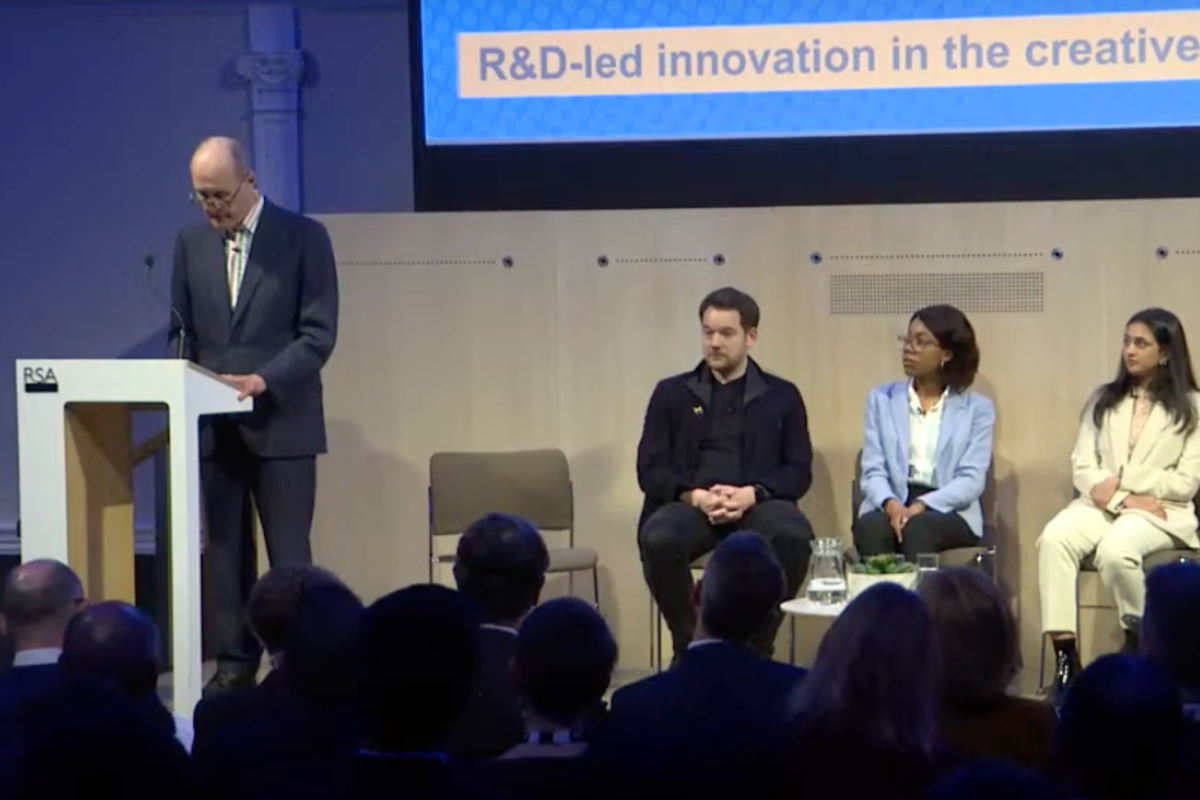
Sir Peter Bazalgette (far left) speaking to an audience at the Royal Society of Arts
Bazalgette: Creative industries must address skills gap
Creative Industries Council co-Chair says the sector must better explain career pathways to parents, teachers and pupils to recruit future talent.
The perception of the creative industries must change to attract the next generation of talent and to unlock potential growth, said Sir Peter Bazalgette in an address to the Royal Society of Arts (RSA) last week.
Bazalgette, former Chair of Arts Council England and current co-Chair of the Creative Industries Council, made the comments while delivering the RSA’s President’s Lecture in a speech on research and development-led innovation in the creative industries.
He said the sector must do more to define career pathways and address skills gaps and data deficits to unlock the potential of the creative industries and to stimulate sustainable and sustained economic growth.
READ MORE:
- Campaign aims to boost recruitment of young creative talent
- Creative degrees can deliver skills and employment
Explaining that any rapidly developing sector should expect to experience skill shortages, Bazalgette said the biggest challenge for the industry is that “we’ve never properly explained ourselves to parents, teachers and pupils”.
“We have a crucial task ahead of us to define to career paths into our industry and if we don’t, we’ll fail to recruit the next generation of talent,” he warned.
He added that he feels the sector is currently not as representative as it should be: “If we claim to be the beating heart of our culture, we need to draw on all communities and I don’t think we can do this if we don’t explain the career pathways into our sector”.
Bazalgette argued that work to promote and define career pathways is imperative to the future success of apprenticeships, T Levels and other workplace opportunities. He suggested a skills audit across the sector “to identify our needs now and in the future”, and cited his greatest concern as the rapid decline of students taking Design and Technology higher education courses, which has fallen by 70% in the last decade.
During his speech, Bazalgette confirmed improving skills will be one of three main engines that will drive the upcoming Creative Industries Sector Vision, alongside creative clusters and university spin outs.
He added the Creative Industries Council is “about to publish” the vision, which will provide policy framework for the next decade, and is set to be centred on a main theme of inclusive growth.
Better data collection
Bazalgette also said the sector is going to need better data to inform fruitful, future policies.
He called for better data collection of goods and services and digital exports and added he is looking towards the Creative Industries Policy and Evidence Centre – which the RSA is set to co-host from May – to “come up with sophisticated measures to capture emerging stuff that is difficult to tie down and doesn’t conform to the old norms of the last century”.
The RSA says Bazalgette’s address comes as it begins cultivating creative corridors across the UK, adding that its work as Creative PEC co-hosts will see it “play a leading role in bringing together regional and sectoral leaders to influence policy and practice and bolster the economic and social impact of the creative industries”.
RSA Chief Executive Andy Haldane added it had been a great privilege to welcome Bazalgette “as we embark on this ambitious new journey to unlock the potential in the creative industries”.
In closing, Bazalgette also referred to the need for sustained inter-departmental government cooperation between the Department for Culture, Media and Sport (DCMS) and other departments.
To ensure sustained growth of the creative industries, he said DCMS must work with the Department for Business and Trade, Department for Education and the newly-formed Department for Science, Innovation and Technology (DSIT), adding that he was pleased to see one minister – Julia Lopez – with a remit working across both DCMS and DSIT.
Join the Discussion
You must be logged in to post a comment.